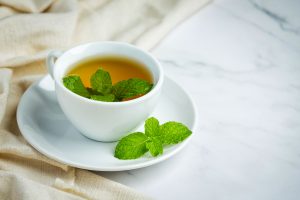The power of peppermint

Peppermint tea is refreshing, and it also has some science-backed benefits such as aiding in digestion, boosting focus and concentration and helping ease migraines.
The minty, peppy, fresh scent and flavor of peppermint packs a punch. While refreshing as a breath mint or tea, peppermint may also be linked to health benefits, including improving digestion, boosting focus, and relieving migraines, according to healthline.com.
Peppermint is an aromatic herb with leaves that contain several essential oils, including menthol, menthone and limonene. Menthol gives peppermint its cooling properties and recognizable minty scent and taste.
Peppermint tea and extracts have some science-backed benefits. According to the National Library of Medicine, a study with nearly 2,000 people showed peppermint reduced the frequency, length and severity of abdominal pain. Another study showed the scent of peppermint oil reduced the incidence of nausea and vomiting in people undergoing chemotherapy. Common digestive issues such as gas, bloating and indigestion can be eased with peppermint.
Research demonstrates that sipping naturally caffeine-free peppermint tea when needing to concentrate and focus or when feeling fatigued may give that needed boost, especially through the hectic and busy holiday season.
Applying peppermint oil diluted with a carrier oil such as coconut or jojoba oil to one’s temples may diminish certain types of headaches. The menthol in peppermint oil increases blood flow and provides a cooling sensation, possibly easing pain.
Due to its antibacterial, antiviral and anti-inflammatory properties, peppermint tea may alleviate clogged sinuses due to infections, the common cold and allergies. The rosmarinic acid in peppermint has been found to reduce symptoms of allergic reactions, such as runny nose, itchy eyes and asthma.
The antibacterial properties in peppermint help kill germs that cause dental plaque, a cause of bad breath, thus its use in flavoring toothpaste, mouthwashes, chewing gums and mints. Furthermore, peppermint effectively inhibits several types of bacteria including those that cause food-borne illnesses and contagious illnesses.
Devon Nelson, FNP, IFMCP at Big Life Integrative Health advised looking for organic options of supplements or oils to avoid any pesticides or herbicides. Nelson cautioned, “There are a lot of different essential oil brands that are only supposed to be used for smell and are not made to be taken by mouth.”
It is also important to note that any herb can interact with other herbs, supplements or medications and even trigger a side effect. Do not give peppermint to an infant or small child. Certain conditions are worsened by peppermint so consult a health care provider with any questions.
By Lisa Nicklanovich; courtesy photo